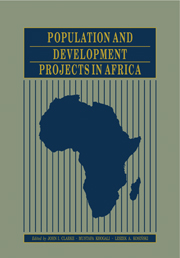Book contents
- Frontmatter
- Contents
- List of Tables
- List of Figures
- List of Contributors
- Preface
- 1 The demographic background to development in Africa
- 2 Development projects and their demographic impact
- 3 Conceptualization of the impacts of rural development projects upon population redistribution
- 4 Capitalism and the population landscape
- 5 Unequal participation of migrant labour in wage employment
- 6 Africa's displaced population: dependency or self-sufficiency?
- 7 Population redistribution and agricultural settlement schemes in Ethiopia, 1958–80
- 8 Populating Uganda's dry lands
- 9 Environmental and agricultural impacts of Tanzania's villagization programme
- 10 Development and population redistribution: measuring recent population redistribution in Tanzania
- 11 Communal villages and the distribution of the rural population in the People's Republic of Mozambique
- 12 A century of development measures and population redistribution along the Upper Zambezi
- 13 Resettlement and under-development in the Black ‘Homelands’ of South Africa
- 14 Development programmes and population redistribution in Nigeria
- 15 Population, disease and rural development programmes in the Upper East Region of Ghana
- 16 Demographic intermediation between development and population redistribution in Sudan
- 17 A typology of mobility transition in developing societies, with application to North and Central Sudan
- 18 Rural population and water supplies in the Sudan
- 19 The impact of the Kenana Project on population redistribution
- 20 Migrant labour in the New Halfa Scheme
- 21 The Gash Delta: labour organization in pastoral economy versus labour requirements in agricultural production
- 22 The impact of development projects on population redistribution to Gedaref Town in Eastern Sudan
- 23 The growth of Juba in Southern Sudan
- Index
5 - Unequal participation of migrant labour in wage employment
Published online by Cambridge University Press: 05 November 2011
- Frontmatter
- Contents
- List of Tables
- List of Figures
- List of Contributors
- Preface
- 1 The demographic background to development in Africa
- 2 Development projects and their demographic impact
- 3 Conceptualization of the impacts of rural development projects upon population redistribution
- 4 Capitalism and the population landscape
- 5 Unequal participation of migrant labour in wage employment
- 6 Africa's displaced population: dependency or self-sufficiency?
- 7 Population redistribution and agricultural settlement schemes in Ethiopia, 1958–80
- 8 Populating Uganda's dry lands
- 9 Environmental and agricultural impacts of Tanzania's villagization programme
- 10 Development and population redistribution: measuring recent population redistribution in Tanzania
- 11 Communal villages and the distribution of the rural population in the People's Republic of Mozambique
- 12 A century of development measures and population redistribution along the Upper Zambezi
- 13 Resettlement and under-development in the Black ‘Homelands’ of South Africa
- 14 Development programmes and population redistribution in Nigeria
- 15 Population, disease and rural development programmes in the Upper East Region of Ghana
- 16 Demographic intermediation between development and population redistribution in Sudan
- 17 A typology of mobility transition in developing societies, with application to North and Central Sudan
- 18 Rural population and water supplies in the Sudan
- 19 The impact of the Kenana Project on population redistribution
- 20 Migrant labour in the New Halfa Scheme
- 21 The Gash Delta: labour organization in pastoral economy versus labour requirements in agricultural production
- 22 The impact of development projects on population redistribution to Gedaref Town in Eastern Sudan
- 23 The growth of Juba in Southern Sudan
- Index
Summary
Introduction
Various traditional conceptions within different disciplines have presented a certain image of population movements generally and of the labour migration of specific groups in particular. Geographers generally describe the movement of groups of people as a geographic or spatial phenomenon, and also describe its potential consequences for changing urbanization rates and levels, the growth of cities in a spatial sense, demographic characteristics of migrants, etc. Meanwhile, economists dwell on the advantages and disadvantages (or costs and benefits) of population movements for the individuals concerned, concentrating in particular on the economic ‘rationality’ of such movements for individual migrants. Arrighi and Saul (1973: 183) have been especially critical of the latter types of analyses, particularly pointing out their unfounded concentration on the ‘spontaneity’ of the market forces (i.e. the free and ‘rational’ choice of individuals in the market place) with little or no role given to open or concealed forms of compulsion.
The point remains that both these traditional conceptions tend to neglect crucial aspects of the reality of population movements, notably:
That population movements are much more than simple spatial or economic phenomena ultimately produced and shaped by the specific historical developments and changes in the systems of economic production in the areas where they occur.
Population movements relate to the differential position of groups within the entire social formation, and are, consequently, a factor of these differential placings rather than being subject to the prerogatives of individual choice or principles of economically rational behaviour, as the latter is defined within the capitalist system. […]
- Type
- Chapter
- Information
- Population and Development Projects in Africa , pp. 53 - 67Publisher: Cambridge University PressPrint publication year: 1985



